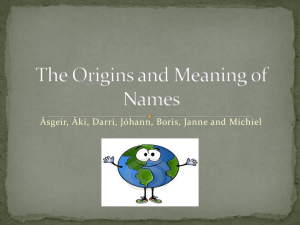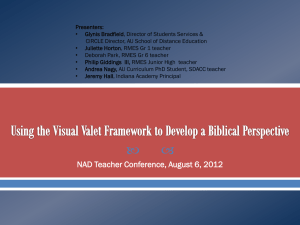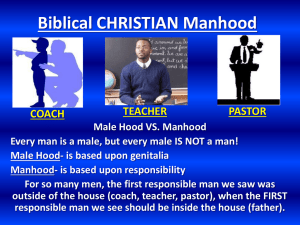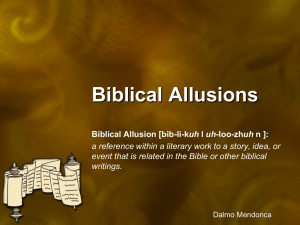Powerpoint Document
advertisement
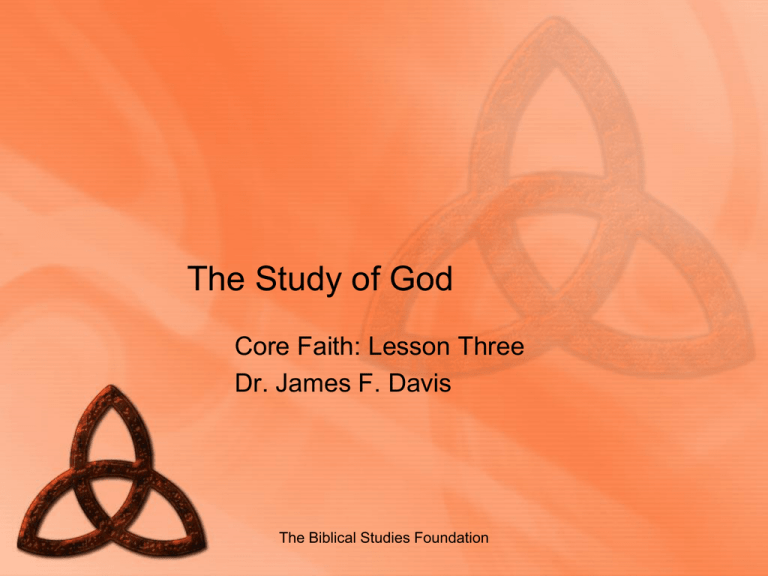
The Study of God Core Faith: Lesson Three Dr. James F. Davis The Biblical Studies Foundation Copyright Notice • You may download this presentation on your computer for personal study or you can print it or use it in a multimedia presentation for yourself and others as long as you give the printed material away and do not charge for it. In this case, free means free. It cannot be bundled with anything sold, nor can you charge for shipping, handling, or anything. It cannot be posted on other websites or servers. It is provided for personal study or for use in preparation and presentation of sermons, Sunday school classes, undergraduate or seminary religion classes or other noncommercial study. Material in the presentation may be edited (added to , deleted or changed) on the condition that no revision contradicts the Bible.org doctrinal statement and that substantive revisions are identified as being the work of a reviser and not that of Dr. Davis. The Biblical Studies Foundation The Triqueta • The Triqueta symbol below is a Celtic Symbol that Christians also used to try and communicate the concept the Trinity: three persons but one God symbolized by three separate ovals that a linked into one shape. • But where does the doctrine of the Trinity come from? The word Trinity itself never occurs in the Bible but the teaching has been a part of the Christian church since the early centuries. • The word theology means the study of God and that is what in essence this lesson is about in an introductory way. The Biblical Studies Foundation Overview of Lesson • • • • Sources of Knowledge about God Basic Names of God Attributes/Perfections of God Evidence and Explanation of the Trinity The Biblical Studies Foundation Sources of Knowledge of God • The source of all knowledge about God comes from God himself and this can be divided into two areas: natural revelation (creation) and special revelation (primarily for us God’s words recorded in the Bible and in the incarnation of Jesus Christ). The Biblical Studies Foundation Natural Revelation • The heavens declare the glory of God; the sky displays his handiwork. Day after day it speaks out; night after night it reveals his greatness. There is no actual speech or word, nor is its voice literally heard. Yet its voice echoes throughout the earth; its words carry to the distant horizon. (Ps 19:1-4). The Biblical Studies Foundation Natural Revelation • For the wrath of God is revealed from heaven against all ungodliness and unrighteousness of people who suppress the truth by their unrighteousness, because what can be known about God is plain to them, because God has made it plain to them. For since the creation of the world his invisible attributes – his eternal power and divine nature – have been clearly seen, because they are understood through what has been made. So people are without excuse (Rom 1:18-20). • What can we learn from the universe about God • 1) God is glorious and beautiful • 2) God is Immense • 3) God is Powerful • 4) God is Good and Provides for all (cf Matt 5:43-45; Acts 14:17) The Biblical Studies Foundation Natural Revelation • God created humankind in his own image, in the image of God he created them, male and female he created them. • • • • God is relational God is love God is moral God is rational The Biblical Studies Foundation Sources of Knowledge of God • Special Revelation • God speaking to man verbally, through signs, dreams, visions and manifestations of God in the Old Testament (cf. Heb 1:1-2) • Focus on two areas the written word of God the Bible and the incarnation of Jesus Christ The Biblical Studies Foundation Special Revelation • The Bible Speaks about God and is inspired by God • It speaks about who God is and what God did and does. • In the beginning God created the heavens and the earth (Gen 1:1). • Every scripture is inspired by God (2 Tim 3:16; NET Bible). The Biblical Studies Foundation Special Revelation • God the Father revealed by the Logos (= Word) who is the Son Jesus Christ • 1:1 In the beginning was the Word, and the Word was with God, and the Word was fully God. 1:2 The Word was with God in the beginning. . .1:14 Now the Word became flesh and took up residence among us. We saw his glory . . 1:18 No one has ever seen God. The only one, himself God, who is in closest fellowship with the Father, has made God known. The Biblical Studies Foundation The Names of God • The First reference to God in the OT is to the Hebrew word “Elohim” (Gen 1:1). Sometimes abbreviated “El”. Root meaning is to “Be strong” perhaps related to a word for mountain. Greek normally translates this as theos (Enns, Handbook of Theology, 197). • Used 2310 times for the true God (Ryrie, Basic Theology, 45). The Biblical Studies Foundation The Names of God • One interesting point about this name is that it is a plural word. • Common explanations for this is that it is a plural of majesty indicating the manifold greatness of God • It has also been suggested that is allows for the later revelation of the Trinity. The Biblical Studies Foundation The Names of God • Compound names for God with Elohim • El-Shaddai: (Gen 17:1) God Almighty (Omnipotent) • El-Elyon: (Gen 14:19) God Most High (Supremacy and Sovereignty) • El-Olam: (Gen 21: 33) The everlasting God (Eternal) • El-Roi (Gen 16:13) The God who Sees (Omniscient) (Ryrie, Basic Theology, 46) The Biblical Studies Foundation The Names of God • The Personal name of God in the OT the Hebrew YHWH or Yahweh.Seems to be related to the Hebrew to be. • The name was considered so sacred in Israel one was not allowed to say it so one said “Adonai = Lord instead. Following this respect the Greek in the Old and New Testaments translated this as kurios. • First occurrence is in Gen 2:4. It occurs about 5321 times in the OT (Ryrie, Basic Theology, 47) The Biblical Studies Foundation The Names of God • Moses said to God, “If I go to the Israelites and tell them, ‘The God of your fathers has sent me to you,’ and they ask me, ‘What is his name?’ – what should I say to them?” God said to Moses, “I am that I am.” And he said, “You must say this to the Israelites, ‘I am has sent me to you.’” God also said to Moses, “You must say this to the Israelites, ‘The Lord ( – the God of your fathers, the God of Abraham, the God of Isaac, and the God of Jacob – has sent me to you. This is my name forever, and this is my memorial from generation to generation (Exod 3:1315).’ The Biblical Studies Foundation The Names of God • Compound names for God with Yahweh • Yahweh Jireh: (Gen 22:14) The Lord Will Provide; Abraham named God this after providing a ram as a substitute for Issac. • Yahweh Nissi: (Ex 17:15) The Lord is my Banner; Moses named God this after a defeat of one of Israel's enemies • Yahweh Shalom: The Lord is Peace (Judges 6:24) • Yahweh Sabbaoth: The Lord of Hosts or Armies (1 Sam 1:3) • Yahweh Maccaddeshsem The Lord your Sanctifier (Ex 31:13) The Biblical Studies Foundation The Names of God • Compound names for God with Yahweh • Yahweh Roi: (Ps 23:1) The Lord my Shephard; • Yahweh Tsidkenu: (Jer 23:6) The Lord our Righteousness • Yahweh Shammah: (Ezek 48:35)The Lord is There The Biblical Studies Foundation The Attributes/Perfections of God • What is God like? The names of God start to address this question but there is much more. • God is the Subject but what is the predicate? God is . . . . .what? The Biblical Studies Foundation The Attributes/Perfections of God • Attributes that are unique to God are called incommunicalble. Some of these are: • God is all powerful (omnipotent)(Job 42:2; Jer 32:17) • God is everywhere (omnipresent) (Ps 139:7-12) • God is all knowing (omniscience)(Is 46:10) • God is unchanging (immutable)(Jas 1:17) • God is eternal (without beginning or end)(Ps 90:2) The Biblical Studies Foundation The Attributes/Perfections of God • Attributes that are God shares or can share with man to one degree are called communicable. Some of these are: • • • • • • God is just/righteous (Gen 18:25; Ps 89:14) God is holy (Is 6:3; Rev 4:8) God is good (Mark 10:18) God is true (1 John 5:20) God is merciful (Eph 2:4) God is love (1 John 4:8) The Biblical Studies Foundation The Trinity • The word “Trinity” does not occur in the Bible but it is a theological formulation of truths that are taught in the Bible. • Definition of the Trinity: One God in three persons the Father, Son and Holy Spirit. • Could also be referred to as “Triunity.” The Biblical Studies Foundation The Trinity • First, the Bible teaches there is one God. • Listen, Israel: The Lord is our God, the Lord is one! (Deut 6:4) • For there is one God . . (1 Tim 2:5) The Biblical Studies Foundation The Trinity • Second, the Bible teaches the Father, Son and Holy Spirit all are God and they all have the characteristics that are unique to God. Father Son Holy Spirit Grace and peace to you from God our Father and the Lord Jesus Christ! (Rom 1:7) But of the Son he says, Your throne, O God, is forever and ever, (Heb 1:8) But Peter said, “Ananias, why has Satan filled your heart to lie to the Holy Spirit and keep back for yourself part of the proceeds from the sale of the land? . . You have not lied to people but to God!” (Acts 5:3-4) The Biblical Studies Foundation The Three Leaf Clover • There is no perfect illustration for the Trinity but it is reported that Saint Patrick used the three leaf clover as a object lesson in teaching about the Trinity’s concept of one God in three persons, The Father the Son and the Holy Spirit. The Biblical Studies Foundation The Trinity The Biblical Studies Foundation Discussion Questions • How much can a person learn about God just from looking at creation? • Which name of God has meant something to you? Explain. • Is one attribute of God more important than another? For example God’s love or God’s justice? • How does the doctrine of the Trinity affect how we define other religions or cults? The Biblical Studies Foundation Discussion Questions • Can someone be a “Christian” and not believe in the Trinity? • How does our theology affect how we live? PowerPoint used with permission from ChristianPPT.com The Biblical Studiestemplate Foundation


